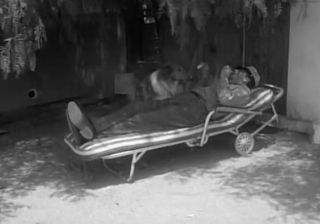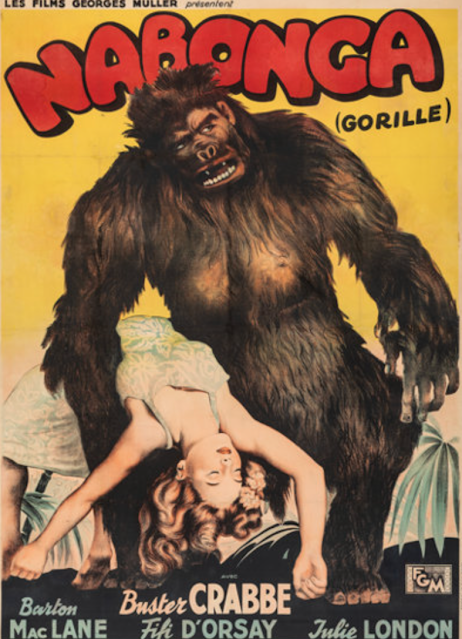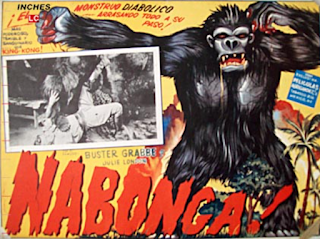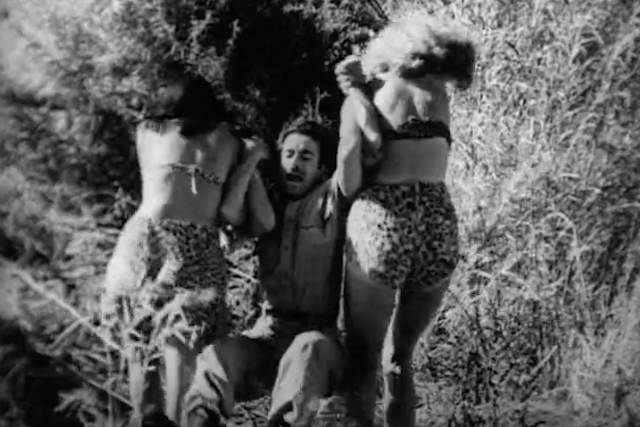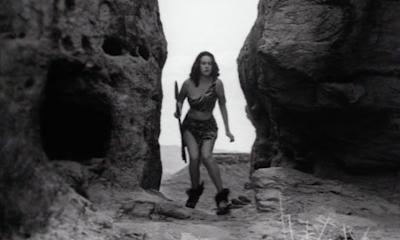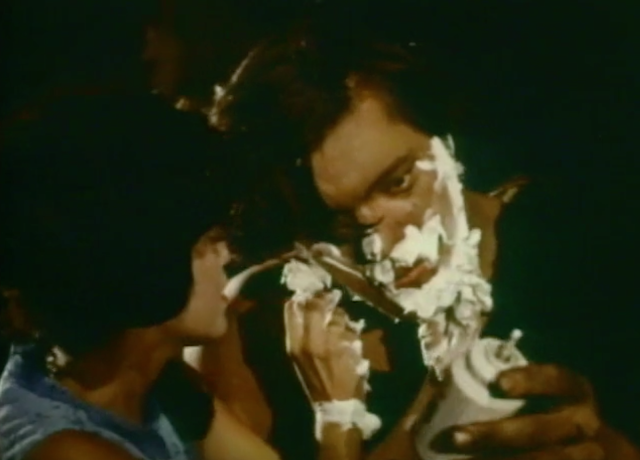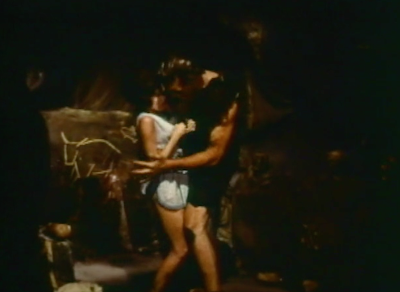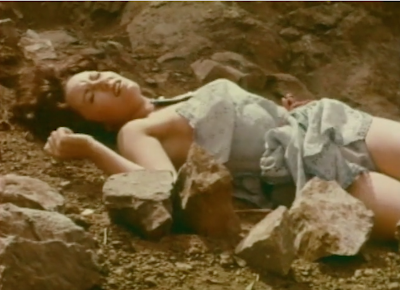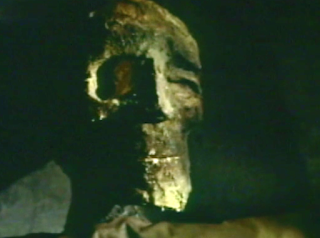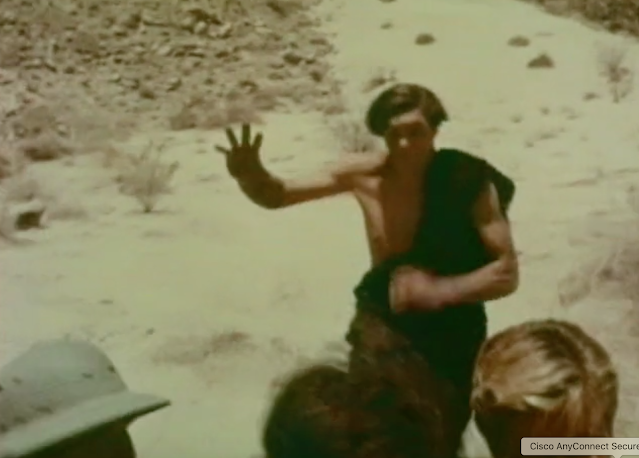But! There is yet another category, where the sublime is awakened almost despite the filmmakers' best efforts towards mediocrity. Sometimes we get the nouvelle vague child's eye surrealism and the coma-inducing flatline. Probably the best--maybe only--example is Coleman Francis' Beast of Yucca Flats. One can never tell if he's trying to actually make a good film or not.
I hope I never find out.
"Touch a button.
Things happen.
A scientist becomes a beast."
The first few minutes of Beast of Yucca Flats create a grim, sleazy claustrophobic atmosphere that runs counter to the rest of the film with its outdoor desert expanses. We hear the loud ticking of an off-camera clock, the cop of time's relentless nightstick strikes. A pretty young woman gets out of the shower, sits down on her single bed against the wall in a closet sized room, and get strangled, killer POV-style. The woman seems to not even know someone is coming at her as the camera POV crowds into the corner of her bed--so tight it's like she's caught on a glass slide. As we fade to credits the killer holds onto her legs and we see the bed starting to rock - leading to whatever weird rape-necrophilia sleaze one's mind can conjure in 1961 without waking the censor. Roll the opening credits! Let us never speak of this scene again, except to wonder if Francis shot it himself (not his style) or it was inserted later by some profit-minded producer/distributor who figured if he at least give the people something salacious, they might not want their money back. In a strategy no doubt gleaned from Godard's use of Bardot's derriere Contempt. (1), the film front loads the sleaze, get it out of the way, and then forgets all about it. The result keeps us on edge for the rest of the film, slightly unnerved.
But we're not here for promised salaciousness, we're here for Coleman's weird fractured poetic narration, the incredibly 'off' editing of scenes, and Ed Wood's go-to heavy, Tor Johnson. Here he starts things out as a Russian defector toting a flammable brief case with secret information on his nation's moon trip (we planted our flag first, but Russia had apparently dropped theirs from orbit in 1959). KGB spies intercept him at the airport, shoot his CIA escorts, chase him out to an empty field in the desert right before a nuclear bomb goes off. (he didn't see the "Testing Range" sign hanging in the weeds). We know he took a hit because his brief case is on fire on the ground. But this don't stop no Tor!
No longer a scientist dedicated to "the betterment of mankind" Tor has become "a beast." who "kills for the sake of killing." The moon forgotten, Tor wanders around the desert scrub, strangling people with his meaty sunburned fingers like a combination Hulk and the mutant father from Barn of the Naked Dead. When he's riled, which is often, Tor waves a stick and makes dubbed "Yaargh!" noises (I think that's Coleman's voice dubbing him as well narrating). Soon two local police search for the killer of a couple on the rood, and end up shooting at the wrong man, a father trying to find his two "adventurous boys" after they get lost wandering around in the scrub. I guess that's the atomic testing ground? The sense of geography is not clear. It seems like they just dropped that bomb in the backyard field without telling anyone.
The film is barely an hour long, at least ten minutes too short to be just an actual movie. And yet it feels like forever, despite the beauty of the rock formations that look like a drunkenly passed-out Willdendorf Venus. The main chase/climax---the only time it's suspenseful--doesn't even involve Tor. It's this poor dad being shot at by the deputy (Coleman) while running from Coleman's beloved little prop plane. In other words, there is no bad guy or good guy here, just dumb decisions and wheel of progress running over everyone in sight.
Why this film is one of the 12 Days of Wood is not only cuz Tor Johnson but because the thunderous "Wagner with the DT's" library score, the same one Ed used for Plan Nine from Outer Space (and Ed's pal Ronnie Ashcroft used for Astounding She Monster). It's probably even literally the same album, like they passed it around. And "Yucca Flats" is, apparently, the name of an apartment complex Ed once lived in (making Ed the real beast?). Some of Francis' voiceover seems a bit slurred (!) and some of that Ed Wood madness is apparent in both the narration's associative leaps and the ease with which a big nuclear blasts erupt at any given time in any given place.
The only debit: Francis lacks Wood's cock-eyed genius. If Wood wrote the script, Yucca might have more cult status. Instead, for Yucca to improve on repeat viewings, you need to surrender to it the same way you might surrender to Jess Franco or Jean Rollin, i.e. to be half-asleep from the start. It doesn't really work at midnight showings or the buds over for beers. It only works when you need to escape even the confines of comfort and retreat into a kind of holding pattern, void of all meaning and value. When you want that lack of feeling, when the smallest emotion could put you back into a panic attack, move to Yucca Flats. You can fall asleep to every night for years and never see the same film twice, or any movie at all, really. While Coleman's narration postulates that all the events you see onscreen are somehow linked to mankind's relentless scientific progress, what we see are just strange looking people running and shooting and waving their arms as they race around the middle of Southwestern scrubland or hang out at a small local airstrip (maybe the same one from Wood's Fugitive Girls? Either way, we know Francis must have a plane there; it's practically the star of all three of his films).
Say what you will about Ed Wood, he had a sound man on the set, and a boom mic. Sometimes. And Criswell's narration was surging ever higher on plumes of uniquely Woodian giddiness and not striving for sociopolitical resonance.
Still, Coleman's narration is pretty special: a weird series of fractured haiku that serves as a bitter existential Korean war vet drunk bitterness flipside to Ed's WW2 vet drunk rapture. With Coleman, you can be zapped by an A-bomb, or shot at by a deputy from an airplane, just for being alive. Francis' jaundiced view of 'scientific progress' seems to be that it's better to be either high in the sky or asleep in your bed. We agree. Be the one killing, not the killed. And if you're going to get caught in something, let it be a race for the betterment of mankind rather than the grinding wheels of progress, or the blast radius of the nuclear age.
His narration warped, deep, occasionally slurred, Francis' jaundiced outlook is rife with strange and abstract tangents that makes the Ed McMahon rants of Daughter of Horror seem like Raymond Carver. Furthering his bitterness, a girl is rescued alive from the beast. "She's still breathing," notes an officer zand then seconds later "doctors can't help her. Maybe angels, but not doctors." We don't see any noticeable change, she seems asleep. It's such an odd choice on Francis' part. Either she's dead or she's alive. In the Francis zone, she survives, only to die as soon as you mention doctors, with no noticeable change in either her or the the voices of the cops carrying her.
If you're up for it, though, Francis' voiceover is a thing of slow-action beauty, and perhaps influential on future filmmakers. Watch Yucca and then watch Guy Maddin's My Winnipeg back and you'll hear the same hypnotic repetitions of words and ideas, the same mix of sensationalism, poetry, and somnambulistic drifting. Sentences come back around like the shooting gallery ducks you missed the first time, clattering around on revolving wheels. With Maddin, it's the wheels of moving train taking him away from Winnipeg while he drifts in and out of sleep; for Francis, it is surely the wheels of progress, ensnaring everything and everyone while they're rousted from the planes and beds and sent staggering dazedly into the unceasing desert sun.
One element that would have helped things along would be some indoor soundstage shots. After that opening, we seldom leave the glaring outdoors during the day (or day-for-night) but at least it's in black-and-white and well-preserved. At time it feels like we're looking at an Ansel Adams or Dorothea Lange desert photography book while wearing very dark sunglasses. Is it supposed to be (day for) night, or did the photographer put on a sun filter? The answer is just the howl of the wind, or is it a coyote? Either way, it's not on the soundtrack. Nothing is... except Francis' narration, the occasional gun shot or snatch of dialogue (never synced to lips) and that incessant Plan Nine music (its brassy stabs never once synced to the editing). Oh and the mom (Mrs. Coleman) occassionally coming in on the soundtrack with sleepy maternal utterances like "Coyotes? Don't you be playing with no coyetes." And "come on."
There are so few indoor shots in Flats though, and so little in the way of foley/diegetic sound, you may get a little wacky after awhile. But Francis know what he's doing. Aside from the opening murder shot there is one more scene set in the top floor bungalow of one of the deputies, that makes us instantly feel calmer and sleepy, the image equivalent of Ms. Francis' overdubs:
It's the morning, the killer has struck; a deputy, Jim Archer, is roused from his morning shut-eye by a visit from the sheriff, irritating his sleepy wife, who sits up and makes sure to show off her deep tan legs and cleavage (terrible bangs though). Clearly she's irritated at some unheard off camera instruction, complying only in the most passive/aggressively manner, the highlight of which is when she bends over facing the camera, so her cleavage takes up the bottom half of the screen, and half-heartedly feigns putting on pants. "See ya later honey" we hear a voice says, in that ghostly post-sync echo so familiar to fans of Doris Wishman. The wife scowls at her off camera exploiter, and gets back into bed, once again giving us a few precious seconds to dig those tanned legs. Would we could stay with her and go to sleep instead of going outside in the glaring heat to shoot at innocent men and climb mountains to nowhere. Instead we're back out amidst the yucky flats, the voluptuous curves, the rocky hills.

"Vacation time - man and wife; unaware of scientific progress."
Their car pulls over on the road so the man is checking the oil or something, oblivious to the giant Swedish wrestler approaching; Jeff's scarred and meaty hands wrap around him from behind, killing him instantly as he barely even puts up a struggle, almost grateful to get his part over with so he can get out of the sun. We think surely "wife" sitting in the car, kind of nodding off, is next!
Unaware of the scientific progress that has left her husband dead behind her, she's ready for throttling. We're expecting Tor to grab her from the front seat window and pull her out like he did with Mrs. Trent in Plan Nine, but instead his hands slowly emerge from the dark of the backseat! He reaches right through the rear view window and grabs her from behind; how did he get there? How could he reach right through the back of the back of the VW hood without the wife looking anywhere but at her cigarette?
Close-ups of the deputy Joe Dobbs picked up, Jim Archer (Bing Stafford) "wounded parachuting over Korea... also caught in the race for the betterment of mankind." Here is a man who never closes his mouth or opens his eyes--the horseshoe of hair around his slick bald head seems to be blowing backwards continually as if he spends a lot of time driving with the top down and never washes. We get a close-up so we can wince at his crooked teeth. We learn he's "trained to hunt down his man... and destroy."
Another family meanwhile is on the road. ("Vacation time. Man and wife. Unaware of scientific progress"). They stop at a gas station. The gas station attendant is lazy, cooked by the heat. but not thinking of moving to the shade Francis' narration sizes the guy up for us. Whatever wheel he's caught in or progress he's unaware of, well, count him out.
"Boys from the city, not yet caught in the wheel of progress, now feed soda pop to the thirsty pigs."
It's not clear why this guy keeps his pigs (and a captured coyote) trapped outside in a place with no shade in what is clearly blistering desert sun. It is clear this was never a movie meant to be studied this closely. It hopes you are paying, at best, moderate attention so you don't really notice these real life horrors (those poor animals), but just keep your eye on the playing card named Jeff Dubrovsky as he rattles every spoke on the wheel of progress. The reels of the film keep spinning, barely pausing to observe the passing absurdity. I could listen to it forever, dozing in and out of a pleasant Remeron coma.
Erich Kuersten... dozing off...
in a Remeron coma.
Watching.
Watching because Tor.
Watching Tor wave his stick.
Erich with his Remeron, Tor with his stick,
a late-night paradise. No wheels in sight, just mentioned over and over, revolving.
Finally arriving in his shady cave, Tor/Jeff throws a huge rock (which is clearly a real rock. Way to go, Tor!) and then shakes his fists at the sky like an old codger at those rascally kids. He's mad the dead girl he brought up there is gone (taken away by the sheriff) but since it's Tor he also evokes an angry infant. As Francs' narration might put it: The old and the new, all at once.
Rock thrown, fist shaken, Dubrovsky begins the laborious process of laying himself down on the very hard and rocky ground to take an afternoon nap. His reticence to just plop down onto the cave floor brings to mind how painful it must be to be Tor's sunbaked Nordic skin, smashed between a hot, rocky, pebbly/dusty surface and that immense wrestler weight, like a gentle cashmere sweater packed under a bowling ball. We feel bad watching a man of Tor's age, skin pigment, and girth, forced to stagger around under the blazing desert sun for hours on end. But we're here for it; we may as well make sure he did not sweat in vain. So onward: Tor raves; motionless mom stands, basket ever at the ready, relentlessly dad flees; incessantly Jim Archer shoots; cluelessly the boys wander. Having sought shelter deep in the recesses of Jeff's cave, we get the second best shot of the film when they carefully creeping past his sleeping girth out into the blazing (?) day/for/night sun.
Anyway, that bit in the cave, the backseat strangulation, and the very last shot with the baby jackrabbit are alone enough to make
Yucca worth it a thousand viewings over (it actually gets better around the fifth visit). It's classic Tor. Though the scene with him laying halfway on top of the dead girl could have gone all roughie/sleazy nut it's clear Tor is a very gentle giant, which gives the scenes where he's lustily lashing his radioactive lips while lying atop her a jokey playful edge. We never hear the sound so we don't know if his mouth is open because he's an insane lusty monster trying to kiss or lick her or is he just moving his mouth, presuming dialogue will be dubbed in later? She's supposed to be dead, or nearly dead. But she seems like she's suppressing a giggle, or a wince. It's clear both are just kind of jovially embarrassed by each others' closeness.
Time to get out of here. First, a word on the wife: there she is (below), Mrs. Francis, standing cactus-like in the middle of the desert; picnic basket ever at the ready, forgotten by all but Coleman's camera, which does at least cut back to her occasionally. It never even occurs to her she can put the basket down. Maybe she thinks some average bear is going to rush out and grab it the moment it's on the ground? Even a hungry coyote smelling the food might bring some kind of relief to her awful isolation.
"Vacation time. People travel east, west, north and south. "
Though his entire oeuvre was more than a bit bent by his joyless outlook on life, his natural affinity for the grotesque, and his utter lack of attention to filmic detail, this Luddite tale of an obese scientist turned into a ravening atomic Beast survives as his weirdest anti-achievement. - Alfred Eaker, 366 Movies.
We end the film with the the wife wandering alone and forgotten around in the scrub; the two boys are rescued in long shot with the 'officers.' Dad is still wandering with the 'neighbor.' The night, like life, crawls onward. Mom and kids are reunited by the cops but we see that only as some far off shadows. Francis isn't interested in that --his camera is up close as Jeff dies. Then the most curious thing: a fearless young jackrabbit comes up and start trying to get at whatever snack the dying Tor has in his shirt pocket. Gingerly, with the gracefulness of a tender giant, his meaty hand pets the rabbit, kisses it and then he is dead. This is life in Yucca Flats. No mercy for the loser. The cops and kids don't even think to put a blanket over him. Off they wander, the wheels won't wait. They can always find the corpse again tomorrow, one guesses, just by watching for the vultures.
These are the rewards to the few who made it to the end, those who used their stupefied bemusement to transcend reality, or those who just dozed off somewhere along the way. Or both. The beauty of the Coleman Francis' opus, is that you can do it all, while not doing a damn thing other than watching the wheel spin endlessly... until all is calm, and all is dark.




